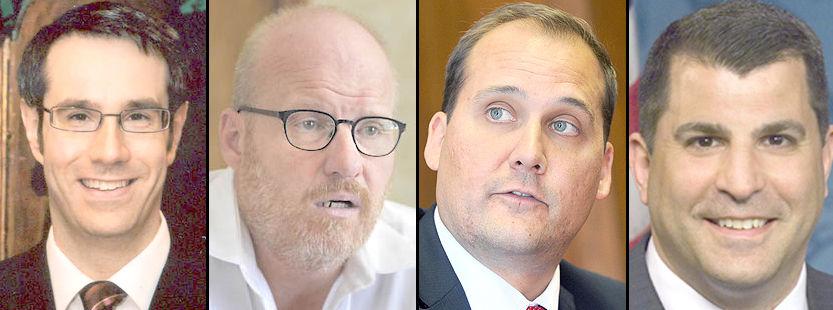|
Statute-of-limitations proponents set to renew push for change in sex-abuse law
By Dave Sutor
Whether to make any new child sexual abuse statute-of-limitation laws retroactive to include past incidents that have gone unpursued in the legal system became a point of contention in the Pennsylvania General Assembly last year. It appears like the same political and legal debate might occur again during the 2017 session that recently got underway. Currently, victims who were under the age of 18 when alleged abuse occurred can file civil charges until they reach age 30. Criminal charges can also be brought until age 30 for individuals born before Aug. 27, 2002. That limit increases to age 50 for accusers born after that same date. During the process, one group – led by state Rep. Mark Rozzi, D-Berks – has sought to make any increase in the statutes include retroactivity, meaning alleged violators could face charges for past allegations that had already surpassed their time limit. That version overwhelmingly passed the House. But the bill that unanimously got through the Senate included an amendment – introduced by Senate President Pro Tempore Joe Scarnati, R-Jefferson – that stripped the retroactivity. No compromise was reached. This year, Rozzi plans to put forth a new bill, possibly by late January, that includes retroactivity. He is still working on the language and said he does not know yet if it will call for increasing the civil limit to 50 years or eliminating statutes of limitation altogether. “Right now, we’re just in the process of putting together exactly everything we want in a bill that’s best for victims,” said Rozzi, who has said that as a child he was raped by a Roman Catholic priest. Rozzi has received support from Johnstown native Shaun Dougherty, who came forward publicly saying he was abused by a priest at St. Clement Church on Lindberg Avenue. Dougherty spoke out after the Pennsylvania Office of Attorney General released a grand jury report in March alleging that the Roman Catholic Diocese of Altoona–Johnstown perpetrated a decades-long coverup of child sexual abuse. “I’m counting on the statute of limitation passing, and I’m counting on retroactivity being part of this bill,” Dougherty said. ‘Black and white’ According to the office of state Sen. John Eichelberger, R-Blair, other legislators plan to introduce a separate bill to extend the civil statute to 50 years but still oppose retroactivity on constitutional grounds. Eichelberger, a leading opponent of retroactivity, offered no other comment. Scarnati did not respond to an interview request. “That bill must be defeated,” Rozzi said. “There’s no victim that stands behind that bill.” Most current senators and House members were involved in the debate last year. Some are about to get involved for the first time. The area’s newest legislator, state Sen. Wayne Langerholc, R-Richland, from the 35th Senatorial District, said he has not made up his mind about the issue. “I have started to research that process and examine the different bills that are out there,” said Langerholc, a former Cambria County assistant district attorney who took office on Tuesday. “That’s something that I definitely will look at and am actively researching.” To legislators still figuring out how to vote, Rozzi said, “It’s black and white. You’re either with the victims or you’re sided with the perpetrators.” ‘Zero-tolerance policy’ Opponents of retroactivity question the legality of subjecting alleged abusers to legal action after their statutes of limitation have passed, while such a change could be financially harmful to organizations. Rozzi thinks the question of retroactivity should be an issue for the Supreme Court of Pennsylvania to decide. Proponents also argue the statutes were reached in some cases because groups, including the Catholic Church, allegedly protected abusers from prosecution for years. The Pennsylvania Catholic Conference and Insurance Federation of Pennsylvania, which did not respond to an interview request, are at the forefront of the opposition. “We expect the debate about statute of limitations reform will continue in the new legislative session,” according to a statement from Amy Hill, spokesperson for the Pennsylvania Catholic Conference. “Without seeing a specific proposal, I can’t say what the Catholic Conference’s position will be. “I can make a point that was often drowned out in the debate about the statutes of limitations last session. The Catholic community is committed to encouraging healing among survivors and their families, and offers lifelong resources for survivors, including counseling and addiction treatment.” Tony DeGol, the Altoona–Johnstown diocese's secretary for communications, issued a similar statement, saying, “We cannot predict what, if any, action lawmakers will take on this issue in this new legislative session. “Regardless of what our elected officials do, the Diocese of Altoona-Johnstown remains committed to a zero-tolerance policy for clergy, employees, and volunteers accused of sexual abuse. Allegations are immediately turned over to authorities and shared with the Pennsylvania attorney general’s office.” DeGol urged anyone with information about suspected abuse to call the attorney general’s hotline at (888) 538-8541 or the diocese at (814) 944-9388. To sign a petition started by Dougherty to be delivered to Scarnati, go to change.org and search Shaun Dougherty. Contact: dsutor@tribdem.com
|
.
Any original material on these pages is copyright © BishopAccountability.org 2004. Reproduce freely with attribution.
